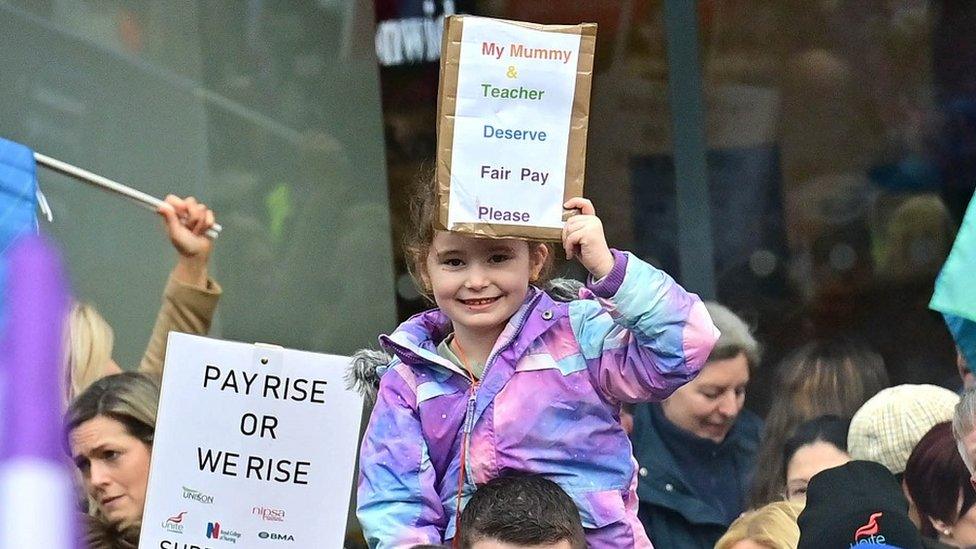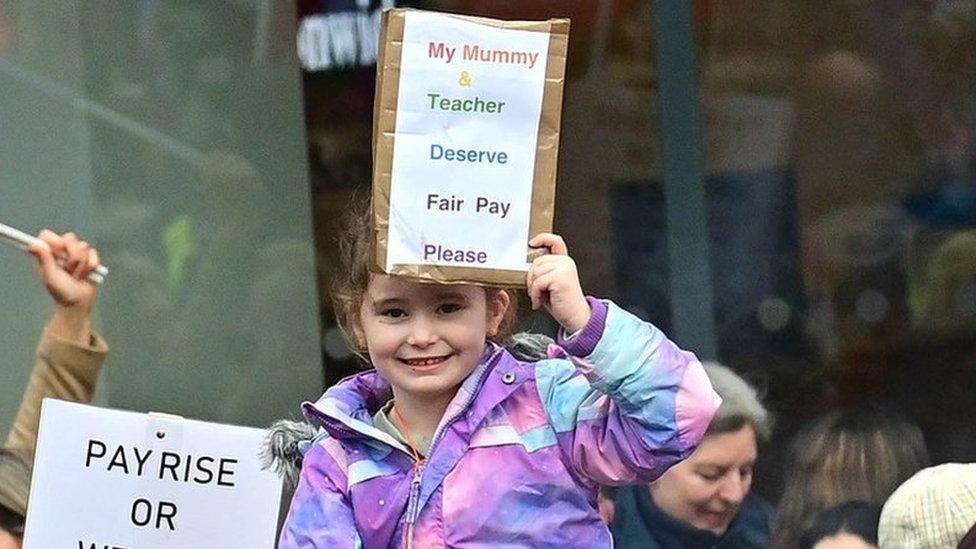Teacher strikes: Five NI unions to take action on 26 April
- Published

Four teaching unions had previously staged a walkout in February
Teaching unions in Northern Ireland are to strike for a full day on Wednesday 26 April.
The National Association of Head Teachers (NAHT) will join four unions who staged a previous walkout on 21 February.
It is expected that most schools in Northern Ireland will close on 26 April as almost every teacher is likely to be on strike.
The action by the teaching unions is mainly due to a dispute over pay.
Members of the National Association of Schoolmasters and Union of Women Teachers (NASUWT) who work in Further Education (FE) colleges in Northern Ireland will, for the first time in the current dispute, also join their colleagues in schools in striking.
There has been stalemate over a pay deal in Northern Ireland for teachers for over a year.
In February 2022, unions rejected a pay offer from employers for the years 2021-2023 as "inadequate".
Since then the cost of living has spiralled with inflation at over 10%.
But with Stormont's Education budget under severe pressure, it is not clear how much money is available to make teachers a pay offer the unions would accept.
The unions striking on 26 April are the NASUWT; the Irish National Teachers' Organisation (INTO); the Ulster Teachers' Union (UTU) and the National Education Union (NEU).
'Very last resort'
They will be joined by the NAHT, which represents many school leaders, who did not take part in the previous action on 21 February.
It is the first time in its 125 year history that members of the NAHT have taken strike action over pay.
The NAHT president in Northern Ireland, Liam McGuckin, said in a statement to BBC News NI that striking was "the very last resort".

NASUWT who work in Further Education (FE) colleges in Northern Ireland will, for the first time in the current dispute, also join their colleagues in schools in striking
"Our members have reached the absolute last shred of their patience with a system that is failing its schools, its workforce and, most importantly, its young people," he said.
"Without expedited significant investment, we will see a profession that holds together much of the fabric of society damaged to an irreparable extent.
"Our children deserve better than this."
'In for the long haul'
Justin McCamphill. who is the national official of the NASUWT, said that the inclusion of the NAHT was "really important".
"It is showing it's not just teachers in the classroom, it's teachers at leadership level," he said.
Mr McCamphill said the continued action showed that union members were "in for the long haul" and urged the department to engage with the government to obtain a better pay rise.
He added that the salary on offer in Northern Ireland would also have an impact on the country's ability to recruit the best teachers.
"The reality is they are going to look at salaries elsewhere on the one hand and on the other hand they are going to look at their fuel bill, their rates, their food bill and they are going to say quite simply I can't afford to live here."
'Fair deal for all'
In a statement, a spokesperson for the five unions said their members had "waited far too long for a satisfactory offer from the employers".
"Teachers' pay, in real terms, has dropped by nearly a quarter in the 'lost decade' since the pay freeze of 2010-11," it continued.
"We are now stepping up our campaign for a fair deal for all teachers.
"Our members have watched governments in other jurisdictions make offers which will lead to pay levels far in excess of what is available in Northern Ireland.
"Collectively, the five recognised unions are saying 'enough is enough' and that government and employers must act now to deliver a pay settlement which recognises the real terms loss in earnings suffered by teachers for more than a decade."
In a separate message to schools informing them of the action, the UTU said that "should the serious concerns of our members not be resolved, UTU reserves the right to engage in further strikes".
A large number of teachers in England are also due to strike on Thursday 27 April and Tuesday 2 May.
The NEU, which is the largest education union in England's schools and colleges, rejected a pay offer of a £1,000 one-off payment this year, and a 4.3% rise next year.
- Published16 February 2022

- Published21 February 2023
